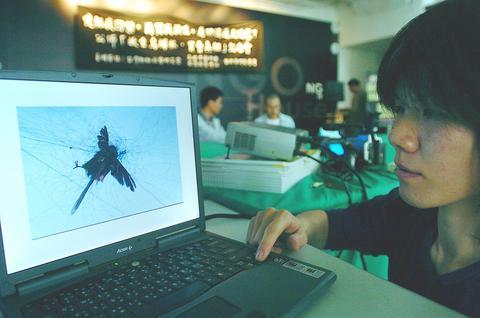Taoist and Buddhist groups have long set birds and other animals free in the belief that it will garner good karma. But in Taiwan, the practice has become so commercialized that it leads to the unnecessary suffering and death of about 600,000 birds each year, animal rights activists said yesterday.
In the last two years, volunteers and activists from both the Environment and Animal Society of Taiwan and the Kaohsiung Teachers Association's Ecological Education Center have visited 155 shops selling birds in the Taipei, Taichung, and Kaohsiung areas. They found that 60 percent them sold captured birds to religious groups, who convince their followers that they can eliminate their bad karma by taking part in freeing the birds.

PHOTO: GEORGE TSORNG, TAIPEI TIMES
At a press conference held yesterday in Taipei, a documentary showing the brutal capture of such birds and their delivery to shops was shown to the media.
Wild birds were captured by nets set up in fields. Some birds were fried in the sun or starved to death because the birdcatchers did not check their nets frequently.
The documentary also showed birds being lured by bait covered with a huge net. Birds struggled after getting stuck, and some died in the net. Those who survive must endure long-distance transportation to places where they're sold. The film showed birds being packed like sardines into regular boxes and shipped by train to customers, who are usually temple leaders.
Activists said that the types of captured birds vary. They have found shops selling turtledoves, Chinese bulbuls, scaly-breasted munias, Japanese white-eyes, sparrows, manikins, and pigeons at prices between NT$10 and NT$300 each.
More expensive birds such as skylark and imported large parrot, are available for NT$1,000 to NT$6,000. And even some protected species, such as Mikado pheasants, Hwamei and lovebirds are sold, at still higher prices.
Activists estimate that only 10 percent of captured birds are actually lucky enough to be freed by religious followers, who usually donate money to event organizers. Nationwide, about 500 religious groups hold such activities.
"We don't blame blind followers, but instead some crafty religious leaders," EAST president Wu Hung (
Wu Hung said disregarding the birds' lives showed no sympathy for animals, and that such activities jeopardize the nation's ecological balance. There is also a potential health risk.
"Mixing diverse bird types during transportation increases the risk of epidemics such as bird flu," Wu Hung said.
Bird conservationists said that wild birds, once captured, are much more likely to die then pet birds because wild birds are easily scared and often refuse to be fed.
Meanwhile, the Legislative Yuan yesterday passed the first reading of a proposal to revise Article 10 of the Animal Protection Law (
"The relationship between demand and supply has been commercially established by dishonest animal catchers, dealers and purchasers," Democratic Progressive Party Legislator Lu Po-chi (
Lu said he would soon work with other legislators to have the revision passed in order to prevent the practise, which though benign in intent has spawned a cruel business.

Nipah virus infection is to be officially listed as a category 5 notifiable infectious disease in Taiwan in March, while clinical treatment guidelines are being formulated, the Centers for Disease Control (CDC) said yesterday. With Nipah infections being reported in other countries and considering its relatively high fatality rate, the centers on Jan. 16 announced that it would be listed as a notifiable infectious disease to bolster the nation’s systematic early warning system and increase public awareness, the CDC said. Bangladesh reported four fatal cases last year in separate districts, with three linked to raw date palm sap consumption, CDC Epidemic Intelligence

Two Taiwanese prosecutors were questioned by Chinese security personnel at their hotel during a trip to China’s Henan Province this month, the Mainland Affairs Council (MAC) said yesterday. The officers had personal information on the prosecutors, including “when they were assigned to their posts, their work locations and job titles,” MAC Deputy Minister and spokesman Liang Wen-chieh (梁文傑) said. On top of asking about their agencies and positions, the officers also questioned the prosecutors about the Cross-Strait Joint Crime-Fighting and Judicial Mutual Assistance Agreement, a pact that serves as the framework for Taiwan-China cooperation on combating crime and providing judicial assistance, Liang

Reports of Taiwanese going missing, being detained or interrogated, or having their personal liberties restricted in China increased about fourfold annually last year, the Mainland Affairs Council (MAC) said yesterday. Last year, 221 Taiwanese who traveled to China were reported missing, were detained and interrogated, or otherwise had their personal freedom restricted, up from 55 the previous year, the council said. Reopening group tours to China would be risky, as it would leave travelers with no way to seek help through official channels after Beijing shut down dialogue between the associations tasked with handling cross-strait tourism, the MAC said. Taipei’s Taiwan Strait Tourism

SHIFT: Taiwan is evolving from a transit stop into a tourist destination, with more international travelers willing to spend on tours, dining and cultural activities Taiwan rose three places in the World Tourism Barometer to 36th globally in 2024, with international tourism revenue of US$10.028 billion, the Tourism Administration said on Monday. The UN Tourism Organization publication said that its focus has switched from whether a country has returned to pre-COVID-19 levels of tourism to the amount spent by a tourist during an overseas trip. The nation last year welcomed 8.57 million international tourists, about 9 percent more than in 2024, with most tourists coming from Japan, South Korea, and Hong Kong and Macau, all of which accounted for at least 1 million tourists each. During the first